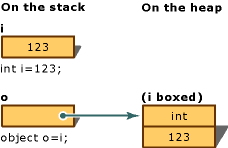Boxing 和 Unboxing (C# 程式設計手冊)
Boxing 是將實值型別轉換為 object 類型或是由這個實值型別實作之任何介面類型的程序。 當 Common Language Runtime (CLR) 方塊實值類型時,它會將值包裝在 實例內 System.Object ,並將其儲存在 Managed 堆積上。 Unbox 處理則會從物件中擷取實值類型。 Boxing 是隱含處理,unboxing 則是明確處理。 Boxing 和 unboxing 的概念是 C# 類型系統統一檢視的基礎,其中任何類型的值都可視為物件。
在下列範例中,整數變數 i 會經過 Box 處理並且指派給 o 物件。
int i = 123;
// The following line boxes i.
object o = i;
接著就可以對物件 o 進行 Unbox 處理,並將該物件指派給整數變數 i:
o = 123;
i = (int)o; // unboxing
下列範例將說明在 C# 中使用 boxing 的方式。
// String.Concat example.
// String.Concat has many versions. Rest the mouse pointer on
// Concat in the following statement to verify that the version
// that is used here takes three object arguments. Both 42 and
// true must be boxed.
Console.WriteLine(String.Concat("Answer", 42, true));
// List example.
// Create a list of objects to hold a heterogeneous collection
// of elements.
List<object> mixedList = new List<object>();
// Add a string element to the list.
mixedList.Add("First Group:");
// Add some integers to the list.
for (int j = 1; j < 5; j++)
{
// Rest the mouse pointer over j to verify that you are adding
// an int to a list of objects. Each element j is boxed when
// you add j to mixedList.
mixedList.Add(j);
}
// Add another string and more integers.
mixedList.Add("Second Group:");
for (int j = 5; j < 10; j++)
{
mixedList.Add(j);
}
// Display the elements in the list. Declare the loop variable by
// using var, so that the compiler assigns its type.
foreach (var item in mixedList)
{
// Rest the mouse pointer over item to verify that the elements
// of mixedList are objects.
Console.WriteLine(item);
}
// The following loop sums the squares of the first group of boxed
// integers in mixedList. The list elements are objects, and cannot
// be multiplied or added to the sum until they are unboxed. The
// unboxing must be done explicitly.
var sum = 0;
for (var j = 1; j < 5; j++)
{
// The following statement causes a compiler error: Operator
// '*' cannot be applied to operands of type 'object' and
// 'object'.
//sum += mixedList[j] * mixedList[j];
// After the list elements are unboxed, the computation does
// not cause a compiler error.
sum += (int)mixedList[j] * (int)mixedList[j];
}
// The sum displayed is 30, the sum of 1 + 4 + 9 + 16.
Console.WriteLine("Sum: " + sum);
// Output:
// Answer42True
// First Group:
// 1
// 2
// 3
// 4
// Second Group:
// 5
// 6
// 7
// 8
// 9
// Sum: 30
效能
相對於單純的指派,boxing 和 unboxing 是會耗費大量運算資源的處理序。 當實值類型經過 Box 處理時,必須配置及建構新的物件。 Unboxing 所需的轉換雖然較為簡單,但也同樣需要大量運算資源。 如需詳細資訊,請參閱效能。
Box 處理
Boxing 可用來儲存記憶體回收堆積中的實值類型。 Boxing 是一種隱含轉換,可將實值型別轉換為 object 類型,或是由這個實值型別實作的任何介面類型。 對實值類型進行 Boxing 處理時,會在堆積上配置物件執行個體,並將值複製到新物件中。
請考慮下列實值類型變數的宣告:
int i = 123;
下列陳述式會以隱含方式對變數 i 套用 boxing 作業:
// Boxing copies the value of i into object o.
object o = i;
這個陳述式的結果是在堆疊上建立物件參考 o,用於參考堆積中 int 類型的值。 這個值是指派給變數 i 之實值類型值的複本。 i 和 o 這兩個變數之間的差異如下方 Boxing 轉換圖所示:

您也可以執行明確的 boxing 處理,如同下列範例中所示,但是明確的 boxing 處理並非必要:
int i = 123;
object o = (object)i; // explicit boxing
範例
這個範例會使用 Boxing 將整數變數 i 轉換為物件 o。 接著,儲存在變數 i 中的值就會從 123 變更為 456。 這個範例顯示,原始實值類型以及經過 Box 處理的物件分別使用不同的記憶體位置,因此可以儲存不同的值。
class TestBoxing
{
static void Main()
{
int i = 123;
// Boxing copies the value of i into object o.
object o = i;
// Change the value of i.
i = 456;
// The change in i doesn't affect the value stored in o.
System.Console.WriteLine("The value-type value = {0}", i);
System.Console.WriteLine("The object-type value = {0}", o);
}
}
/* Output:
The value-type value = 456
The object-type value = 123
*/
Unbox 處理
Unboxing 是將 object 類型明確轉換為實值型別,或將介面類型明確轉換為實作介面之實值型別的程序。 Unboxing 作業包含:
檢查物件執行個體,確定它是所指定實值類型經過 Box 處理的值。
將值從執行個體複製到實值類型變數。
下列陳述式將示範 boxing 和 unboxing 作業:
int i = 123; // a value type
object o = i; // boxing
int j = (int)o; // unboxing
下圖示範上述陳述式的結果:

若要在執行階段成功對實值類型進行 Unbox 處理,要進行 Unbox 處理的項目必須是物件的參考,而且該物件是先前對該實值類型的執行個體進行 Box 處理所建立的物件。 嘗試對 null 進行 Unbox 處理會造成 NullReferenceException。 嘗試對不相容的實值類型參考進行 Unbox 處理會造成 InvalidCastException。
範例
下列範例將示範 Unboxing 無效且產生 InvalidCastException 的案例。 若使用 try 和 catch,則會在發生錯誤時顯示錯誤訊息。
class TestUnboxing
{
static void Main()
{
int i = 123;
object o = i; // implicit boxing
try
{
int j = (short)o; // attempt to unbox
System.Console.WriteLine("Unboxing OK.");
}
catch (System.InvalidCastException e)
{
System.Console.WriteLine("{0} Error: Incorrect unboxing.", e.Message);
}
}
}
這個程式會輸出:
Specified cast is not valid. Error: Incorrect unboxing.
如果您將陳述式:
int j = (short)o;
變更為:
int j = (int)o;
轉換將會執行,而且您會得到下列輸出結果:
Unboxing OK.
C# 語言規格
如需詳細資訊,請參閱<C# 語言規格>。 語言規格是 C# 語法及用法的限定來源。
另請參閱
意見反應
即將登場:在 2024 年,我們將逐步淘汰 GitHub 問題作為內容的意見反應機制,並將它取代為新的意見反應系統。 如需詳細資訊,請參閱:https://aka.ms/ContentUserFeedback。
提交並檢視相關的意見反應
